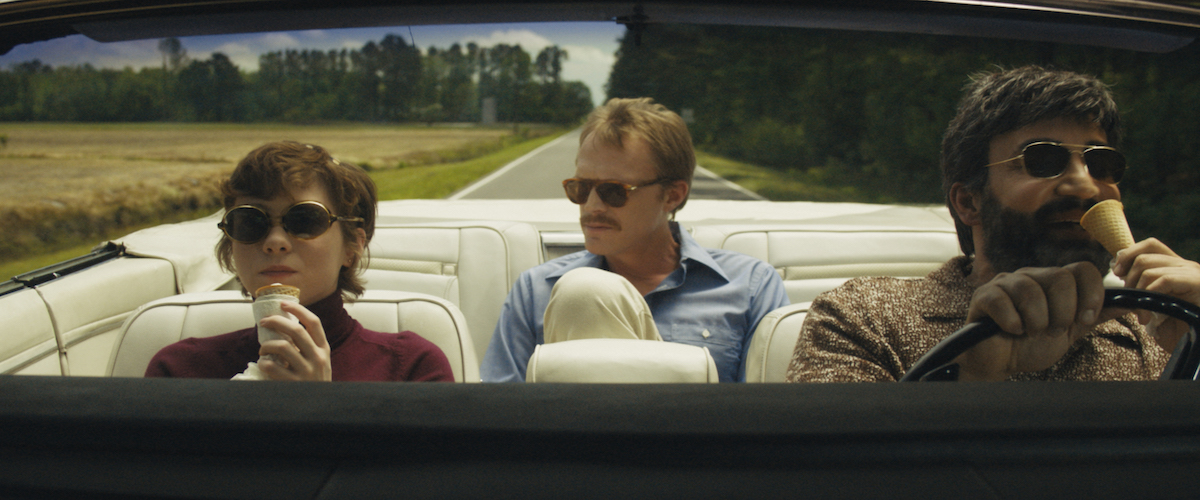Movie Info
Movie Info
- Director
- Alan Ball
- Run Time
- 1 hour and 35 minutes
- Rating
- R
VP Content Ratings
- Violence
- 1/10
- Language
- 4/10
- Sex & Nudity
- 6/10
- Star Rating
Relevant Quotes
Beloved, let us love one another, because love is from God; everyone who loves is born of God and knows God. Whoever does not love does not know God, for God is love.

Writer/director Alan Ball’s semi-autobiographical story of family conflict and love moves between Creekville, South Carolina, and Manhattan. It is told by the teenaged Betty (Sophia Lillis) and begins in the summer of 1969 when her uncle, Frank Bledsoe (Paul Bettany), has returned from Manhattan where he is a college professor to join the family celebration of his father’s (Stephen Root) birthday. Of all the relatives Uncle Frank is her favorite because he takes her seriously as a person. She does not understand why her grandfather Daddy Mac is so cold, even cruel, to him. During their conversation Betty talks about her limited aspirations and her dissatisfaction with even her name. Frank tells her there is a larger world beyond the small town and that she can become anything she wants to be, even change her name if she wants to do so. Talking further, he urges her to call him if ever she is in trouble, such as an unexpected pregnancy.
Jump to Manhattan 4 years later where Beth (short for her new name Elizabeth) is enrolling in the same college where her Uncle Frank teaches. She is driven there by her parents Kitty (Judy Greer) and Mike (Steve Zahn), the latter Frank’s younger brother. Frank invites them to dinner at his girlfriend Charlotte’s apartment. They are puzzled because Frank has never mentioned her. He explains that he was worried what the family would think about him dating a Jewish woman, to which the clueless Mike, apparently thinking he is showing that he is tolerant, says, “At least you’re not black.”
After a very short affair with an exploitive boy who turns out to be gay when she and him crash Frank’s party and drinks too much, she finds herself waking up the next morning at Frank’s apartment. She was surprised the night before to Discover that her uncle and his supposed girlfriend were gay, and that Frank lived with a roommate from Saudi Arabia, Walid, or Wally (Peter Macdissi). She agrees t other uncle’s request not to reveal his sexual identity to the family. Wally explains that he has not come out to his family, that were it to be become public knowledge there, he would be executed. This is why he has come to America to find work as an engineer. They are interrupted by a phone call from Creekville, informing them that Daddy Mac has died suddenly.
Frank has been so repulsed by his father that he does not want to go to the funeral, but because Beth’s mother had been so paranoid about air travel that she has prohibited her daughter from flying, Frank agrees to drive her home. Wally wants to come and meet the family at last, but Frank is adamant that he stays home. During the trip Beth asks about his life, Frank explaining that his awareness of his attraction to boys was in high school when he and Sam (Michael Perez) were swimming at the lake, There are flashbacks inserted at various points (16-year old Frank played by Cole Dorman). In one of these the boys are kissing in Frank’s room when Daddy Mac discovers them.
Of course, during the journey Frank discovers Wally is trailing them in a rental car. When they check into a motel in Clearcreek and ask for a single room with a cot in order to save to save money, the hostile motel manager insists that they rent a separate room for Beth sleep in. Leaving Frank at the motel, Frank stops first to buy a bag of small bottles of liquor. Downing one quickly in the car, he asks Beth not to tell Wally. He knows that Wally will disapprove because he (Frank) is a recovering alcoholic. When he and Beth join the extended Bledsoe family, Frank has another flashback to his father ordering him to have nothing to do with Sam, or he will kill them both. He warns his son that he is a faggot on the road to hell. Then another to their swimming lake where from the long dock Frank can see Sam’s drowned body afloat in the middle. The one-line note left for him infers that the drowning is a suicide. The family welcomes them but question why they are staying at a motel. They are also puzzled by Beth’s accidentally mentioning Wally, she and her uncle spinning a lie about him being a man they met and befriended at the motel. However, Frank’s sister Neva (Jane McNeill), who has long been aware that her brother is gay and thus knows about Wally, wants Frank to bring him to the reception.
Following the open air funeral service at the cemetery, the family gathers at their home where the lawyer tells them that Daddy Mac had insisted in his will that it be read right after the funeral. This will be an explosive event, hurling Frank out of the house and possibly repeating at the lake what his friend Sam had done years before. But love overcomes despair and hate, first with Frank’s coming to terms with himself at Sam’s grave site, and then with a partially satisfying series of reconciliatory encounters with members of his family.
I write “partially satisfying” because I wonder how realistic that ending is, given the intensity of the homophobia of the “Christian” society of Creekville. This film offers viewers the opportunity to reflect upon and discuss the homophobia that so percolates in what passes for Christianity. Note in the film how religion and homophobia are assumed to go hand in hand, such as when frank tells Beth that a choir director was gay, and she replies, “I thought he was religious.” Or near the end, when relatives are discussing the Bible in regard to its teachings on the subject.
It should be enough, using Jesus’ words, “By their fruits you shall know them,” to witness the hatred spewed out by anti-gay Christians, so horrific that it has led to torture and murder. But is also necessary to examine more closely what a close study of the supposedly anti-gay Scripture passages trotted out to justify homophobia—Genesis 19, Leviticus 18:22. 22, and in Romans—actually say. Rather than go into it in this review, I will include more with the questions that will accompany this in the April Visual Parables. Those wanting more now can log onto the Frontline article “Does the Bible NOT Oppose Homosexuality?”
Clearly, this is a film that is not just entertaining, but one that will leave one thinking about it for many days afterward.
In addition to the Frontline article you might want to read “The Best Case for the Bible Not Condemning Homosexuality.”
This review will be in the April issue of VP along with a set of questions for reflection and/or discussion. If you have found reviews on this site helpful, please consider purchasing a subscription or individual issue in The Store.

